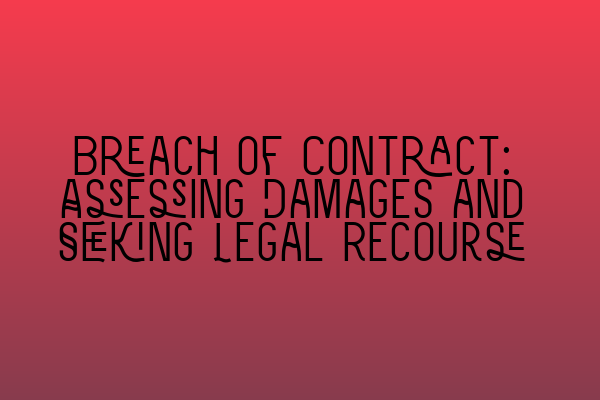Breach of Contract: Assessing Damages and Seeking Legal Recourse
In the world of business, contracts serve as the foundation of any agreement. They are legally binding documents that outline the rights and obligations of all parties involved. Unfortunately, not all contracts are fulfilled as promised, leading to a breach of contract. In such cases, it is crucial to understand the concept of damages and know how to seek legal recourse to protect your interests.
What is a breach of contract?
A breach of contract occurs when one party fails to fulfill their obligations as outlined in the contract. This failure to perform can take numerous forms, such as failing to deliver goods or services as agreed, not making timely payments, or deviating from the terms and conditions specified in the agreement.
When a breach of contract occurs, it is essential to determine the extent of the breach and assess the resulting damages.
Types of damages
Damages are the monetary compensation awarded to the non-breaching party as a result of the breach of contract. There are several types of damages that can be claimed:
- Compensatory damages: These damages aim to compensate the non-breaching party for any losses incurred due to the breach. They are intended to put the injured party in the position they would have been in had the contract been properly fulfilled. Compensatory damages may cover direct costs, such as lost profits, as well as indirect damages, such as reputational harm.
- Consequential damages: Also known as special damages, they include losses that do not directly arise from the breach itself but are a consequence of it. For example, if a supplier fails to deliver goods on time resulting in the loss of a major contract, the non-breaching party may claim consequential damages for the lost future profits.
- Liquidated damages: In some contracts, the parties agree in advance to a fixed amount of damages in case of a breach. These are known as liquidated damages. They are included to provide certainty and avoid the need for costly litigation to determine the appropriate compensation. However, liquidated damages clauses must be reasonable and proportionate to the potential harm caused by the breach.
- Punitive damages: Punitive damages are rare in contract law. They go beyond compensatory damages and are intended to punish the breaching party for their misconduct. Punitive damages are typically awarded in cases where the breach involved fraudulent or malicious behavior.
It is important to consult with a solicitor who specializes in contract law to assess the type of damages applicable to your specific case.
Seeking legal recourse
When facing a breach of contract, it is advisable to seek legal recourse to protect your rights and interests. Here are the recommended steps to take:
- Review the contract: Carefully review the terms and conditions of the contract to ensure there is indeed a breach.
- Document the breach: Collect evidence of the breach, such as correspondence, invoices, or any other relevant records. This documentation will be crucial in supporting your case.
- Notify the breaching party: Send a formal notice to the breaching party, highlighting the breach and requesting corrective action within a specified timeframe.
- Explore negotiation and mediation: Depending on the nature of the breach, you may opt for negotiation or mediation to resolve the dispute amicably. This can help avoid costly and time-consuming litigation.
- Consider litigation: If negotiation or mediation fails, you may need to file a lawsuit to enforce your rights. Hiring a solicitor experienced in contract law is crucial to navigate the legal process effectively.
Remember that each breach of contract case is unique, and the legal recourse may vary depending on the specific circumstances. Seeking professional legal advice early on can significantly increase your chances of a successful outcome.
If you are preparing for the SQE exams that cover contract law, we recommend exploring the following related articles:
- SQE 1 Practice Exam Questions
- SQE 1 Practice Mocks FLK1 FLK2
- SQE 2 Preparation Courses
- SQE 1 Preparation Courses
- SRA SQE Exam Dates
These resources will provide invaluable guidance and practice for your upcoming exams.
In conclusion, a breach of contract can have significant implications for both parties involved. Understanding the concept of damages and seeking legal recourse is essential to protect your rights and recover any losses incurred. By following the appropriate steps and seeking professional legal advice, you can navigate the process effectively and increase your chances of a favorable outcome.
